Global Quantum Computing Market is estimated to be worth USD 3.5 Billion in 2022 and is projected to grow at a CAGR of 6.8% between 2023 to 2032. The study has considered the base year as 2022, which estimates the market size of market and the forecast period is 2023 to 2032. The report analyzes and forecasts the market size, in terms of value (USD Billion), for the market. The report segments the market and forecasts it by offering, by deployment, by technology, by application, by end user and region/country.
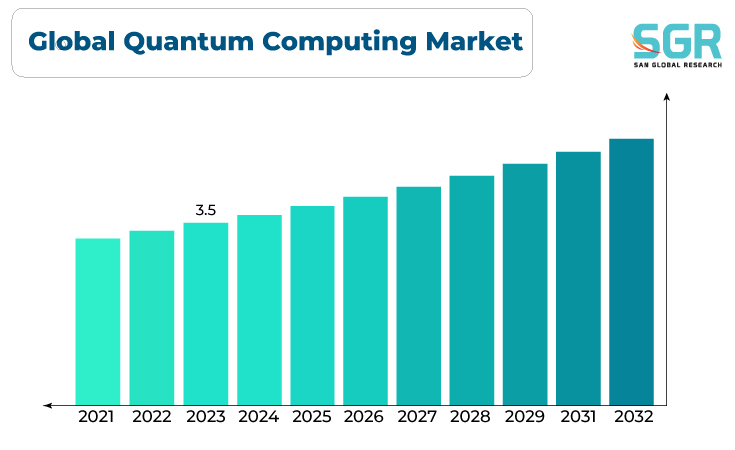
The global quantum computing market has surged as a frontier of technological innovation, poised to revolutionize computation capabilities in ways previously unimaginable. This market's growth is propelled by an increasing realization of the potential for quantum computing to solve complex problems that traditional computers struggle with, particularly in areas such as cryptography, drug discovery, optimization, and materials science. The market has witnessed significant investments from governments, technology giants, and startups, fueling research and development to achieve quantum advantage—a point where quantum computers outperform classical computers. Nations and companies worldwide are in a race to achieve quantum supremacy, investing heavily in developing quantum hardware, software, and algorithms. However, despite substantial advancements, quantum computers are still in their nascent stage, facing challenges like error correction, scalability, and maintaining quantum coherence. The market is characterized by collaborations among research institutions, academia, and industry players to overcome these hurdles and unlock the transformative potential of quantum computing. The global quantum computing market is poised for exponential growth, promising a paradigm shift in computational capabilities and potentially reshaping various industries in the years to come.
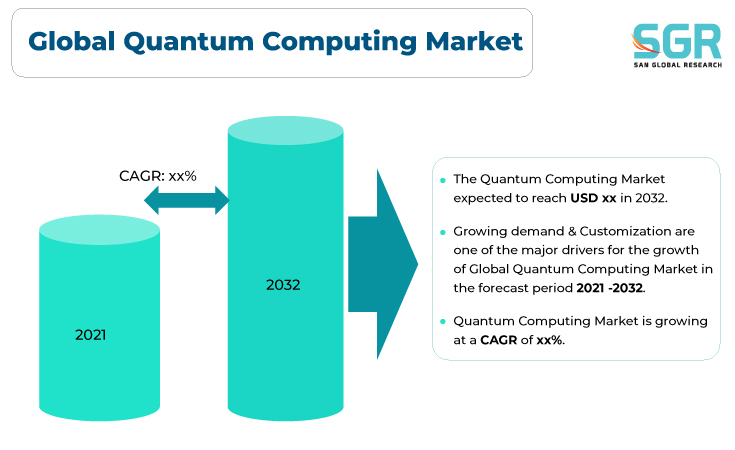
Region Wise Comparison:
North America boasted significant investments from both the public and private sectors, including tech giants, startups, research institutions, and government initiatives. Companies like IBM, Google, and Microsoft had been pioneering quantum computing research and development, fostering a robust ecosystem. Moreover, the presence of leading universities and research centers contributed to the advancement of quantum computing technologies.
European countries, including the United Kingdom, Germany, France, and the Netherlands, had been actively involved in quantum computing research and initiatives. The European Union had launched several projects aimed at fostering quantum technologies. Countries like Germany had strong initiatives in quantum research, while the EU's Quantum Flagship program aimed to accelerate quantum technology development. Additionally, collaborations among European countries and participation in global quantum computing projects were notable.
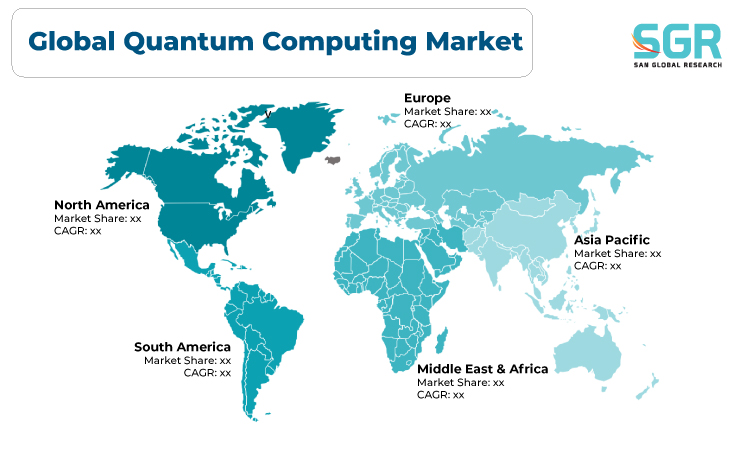
Countries in Asia, notably China and Japan, were making substantial strides in the quantum computing domain. China had announced ambitious plans to become a global leader in quantum computing and had made significant investments in research and infrastructure. Japan, with its renowned research institutions, was also actively engaged in quantum computing initiatives. Singapore and South Korea had started investing in quantum technology research as well.
While North America, Europe, and Asia had been at the forefront of quantum computing development, other regions were also gradually entering the quantum computing landscape. Australia, for instance, had been investing in quantum technology research and partnerships. Meanwhile, some initiatives in South America and Africa were emerging, but the pace and scale of development was comparatively slower.
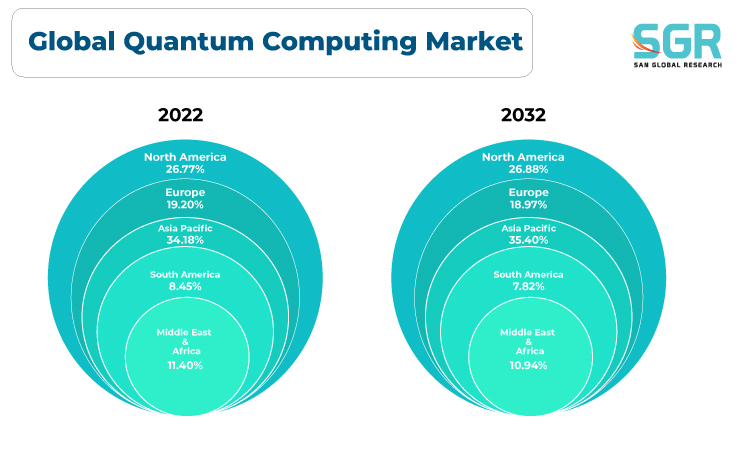
Segmentation:
The Global Quantum Computing Market is segmented by offering, by deployment, by technology, by application, by end user and region/country.
By Offering:
- Based on the Offering, the Global Quantum Computing Market is bifurcated into Systems & Services – where the system is dominating and ahead in terms of share.Quantum hardware encompasses quantum bits (qubits), which form the fundamental unit of quantum information processing. These qubits are fragile and require specialized systems for their maintenance and control, such as quantum processors, cryogenic systems for maintaining extremely low temperatures, and error correction mechanisms. Quantum software, on the other hand, involves algorithms, programming languages, and simulation tools tailored for quantum systems, aiming to harness the unique capabilities of quantum computers. Additionally, a robust quantum networking infrastructure is essential for connecting and transmitting quantum information securely across various nodes. Supporting this infrastructure are research institutions, academia, and private companies conducting R&D to overcome technical challenges and advance quantum computing capabilities.
By Deployment:
- Based on the deployment the Global Quantum Computing Market is bifurcated into On Premise & Cloud – where On Premise is dominating and ahead in terms of share.
By Technology:
- Based on the Technology, the Global Quantum Computing Market is bifurcated into Trapped Ions, Quantum Annealing, Superconducting Qubits and Others – where the Trapped Ions is dominating and ahead of others in terms of share.
By Application:
- Based on the Application, the Global Quantum Computing Market is bifurcated into Optimization, Simulation, ML and Others – where the Optimization is dominating and ahead of others in terms of share.
By Application:
- Based on the Application, the Global Quantum Computing Market is bifurcated into Space & Defense, Transportation & Logistics, Healthcare & Pharma, Chemicals, Banking & Finance, Energy & Power, Academia and Govt. – where the Space & Defense is dominating and ahead of others in terms of share.
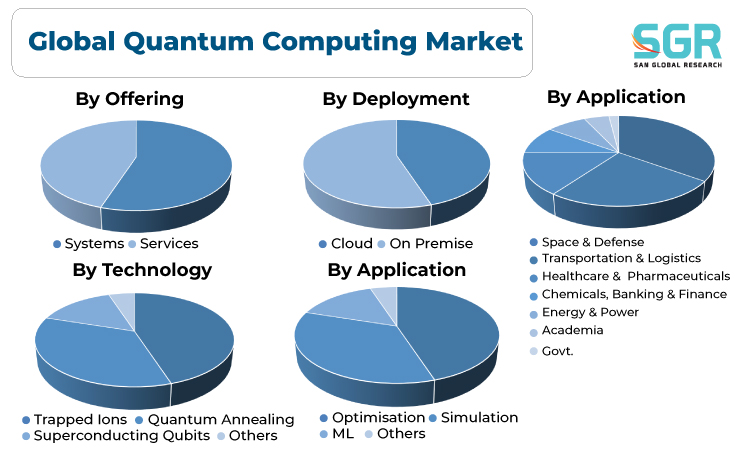
On the basis of region
- North America
- Europe
- Asia Pacific
- South America and
- Middle East and Africa
In 2022, North America is anticipated to dominate the Global Quantum Computing Market with market revenue of XX USD Million with a registered CAGR of XX%.
Key Players:
The key market players operating in the Global Computer Aided Engineering Market include
- IBM
- MICROSOFT
- AWS
- FUJITSU
- HITACHI
- TOSHIBA
- INTEL
- NEC
- HUAWEI
- BOSCH
- ACCENTURE
Drivers:
Growing sector across the globe
The global quantum computing market is propelled by a convergence of factors that fuel its rapid growth and development. Firstly, the insatiable demand for processing power to tackle complex problems beyond the reach of classical computers is a significant driver. Quantum computing's promise to solve computationally intensive challenges in areas like cryptography, drug discovery, optimization, and material sciences fuels immense interest and investment. Moreover, technological advancements and breakthroughs in quantum hardware, such as achieving higher qubit counts and improved qubit quality, serve as catalysts, pushing the boundaries of quantum computing capabilities. Additionally, heightened competition among nations and industries to achieve quantum advantage or supremacy drives substantial research and development initiatives. Governments and tech giants worldwide are racing to achieve quantum breakthroughs, spurring innovation and fostering a competitive market landscape. Furthermore, the increasing collaborations among academia, research institutions, and private entities propel advancements in quantum algorithms, software, and error correction techniques, critical for harnessing the potential of quantum computing. The global quantum computing market is also bolstered by the growing recognition of its transformative potential across sectors, fostering a vibrant ecosystem supported by investments, partnerships, and talent acquisition. As these drivers continue to converge, they collectively steer the trajectory of the global quantum computing market towards unparalleled advancements and commercial applications.
Opportunity:
Evolving Market
The global quantum computing market offers a landscape rich with opportunities poised to reshape industries and revolutionize technological capabilities. One of the most significant opportunities lies in solving complex problems that surpass classical computing capabilities. Quantum computing potential to revolutionize fields like drug discovery, cryptography, optimization, and materials science presents a vast realm for innovation and groundbreaking discoveries. Moreover, there's an opportunity for collaboration and partnerships among various sectors—academia, research institutions, tech companies, and governments—to foster an ecosystem conducive to advancements in quantum technology. The market offers openings for the development of quantum-resistant cryptography, addressing the security threats posed by quantum computers to traditional encryption methods. Furthermore, the rise of quantum cloud services presents a new avenue for delivering quantum computing power on-demand to a broader range of users and industries. Quantum computing education and skill development are also burgeoning opportunities, ensuring a pool of qualified professionals equipped to navigate and exploit the potential of quantum technology. Additionally, as quantum computing matures, there's immense potential for new business models, startups, and industries to emerge, catering to the demands and challenges of a quantum-enabled world.
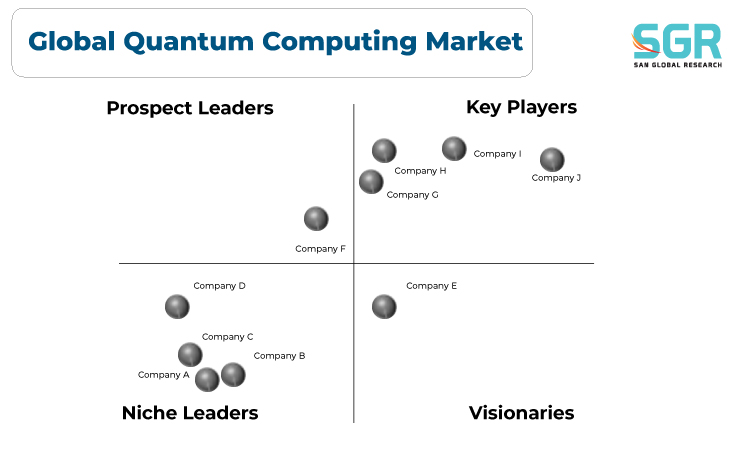

 Description
Description
 Gera Imperium Rise,
Gera Imperium Rise,  +91 9209275355
+91 9209275355


